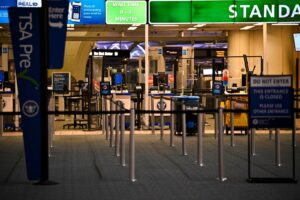Air Canada is planning to cancel scores of flights in the coming days as it faces an imminent pilot walkout.
The airline is planning to begin canceling mainline operations under its Air Canada and Air Canada Rouge brands as soon as Sunday, Sept. 15, gradually winding down its operations over a three-day period. Pilots can issue a 72-hour strike notice on Sunday at the end of a 21-day “cooling off” period, which would allow them to begin the strike as soon as Wednesday, Sept. 18. The airline can also choose to lock pilots out on the same timeline.
Want more airline-specific news? Sign up for TPG’s free biweekly Aviation newsletter.
Air Canada is offering flexible travel waivers for passengers scheduled to fly Sept. 15-23.
In a statement, Air Canada said that negotiations with the Air Line Pilots Association — which represents around 5,200 pilots at the carrier — were “nearing impasse” and described a work stoppage as being “increasingly likely.”
“We understand and apologize for the inconvenience this would cause our customers,” the airline said in a statement. “However, a managed shutdown is the only responsible course available to us.”
“Air Canada believes there is still time to reach an agreement with our pilot group, provided ALPA moderates its wage demands which far exceed average Canadian wage increases,” the airline added in a statement.
The airline has accused the pilots union of being unreasonable in its demands, a sentiment it continued to express in this week’s latest statement. The carrier’s latest offer would give pilots a 30% raise over three years, including a 20% raise that would take effect immediately, Bloomberg reported last week.
Air Canada Express flights, which are operated by third-party regional carriers Jazz and PAL Airlines, would continue to operate as normal during a strike, Air Canada said.
Flight delayed or canceled? Here are the best credit cards with trip delay reimbursement
Passengers traveling on Air Canada next week can proactively cancel or change their trips. Or, they can wait until the airline cancels the flight if a strike does take place. Either way, customers are entitled to a refund for the unused ticket.
Notably, however, Canada’s consumer protection laws consider a strike to be outside the airline’s control. This means that if someone has travel plans that they do not cancel or change, the airline won’t be responsible for compensating passengers for expenses like meals, hotels, alternative flights or other incidental expenses.
In a statement on Aug. 30, ALPA said that it was seeking a labor contract that was in line with competitor airlines.
“We want to reach an agreement with Air Canada to avert a strike,” first officer Charlene Hudy, Air Canada ALPA chair, said. “And although we made some progress in conciliation, management continues to force us closer to a strike position by not listening to our most pressing needs at the negotiating table regarding fair compensation, respectable retirement benefits, and quality-of-life improvements.”
The union did not immediately respond to TPG’s request for more details.
US airline strikes remain a ways off
Meanwhile, United Airlines flight attendants voted overwhelmingly in late August to authorize a strike as the workgroup ramps up negotiations over its own contract. That followed recent moves toward a strike by flight attendants at Alaska Airlines and American Airlines.
Cabin crews at American are in the process of voting on a tentative agreement with the airline, while flight attendants at Alaska recently voted to reject their own tentative agreement.
Still, an actual strike at any of the airlines remains unlikely in the near term. The federal Railway Labor Act sets a strict process for transportation worker actions, with numerous negotiating steps and breaks before a strike can be allowed.
A strike authorization vote is nevertheless a significant move by workers at the airlines, and it’s always possible that the two sides fail to reach an agreement in time to avert a walkout. For now, though, there’s no imminent disruption to operations in the U.S.
We’ll update you on anything you need to know surrounding travel disruptions, so be sure to stay tuned to TPG.
Related reading:
- Key travel tips you need to know — whether you’re a first-time or frequent traveler
- Best travel credit cards
- Where to go in 2024: The 16 best places to travel
- 6 real-life strategies you can use when your flight is canceled or delayed
- 8 of the best credit cards for general travel purchases
- 13 must-have items the TPG team can’t travel without



